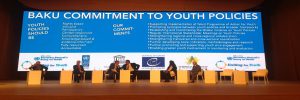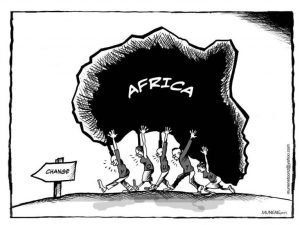Introduction
Presidential term limits (term limits) have been in the spotlight in Africa with the most recent developments in The Gambia, Rwanda, Burundi and Democratic Republic of Congo (DRC) among other countries. Alterations to term limits have largely been achieved through Constitutional amendments. This has occurred in 12 out of 33 countries with Constitutional provisions on term limits.[1] These countries share common a history of, and for some prevalence of, domestic conflict as is the case with DRC.[2] The African Union (AU)’s Constitutive Act of 2000 is the most important authority in scope for upholding the rule of law.[3] This will be explored within the context of domestic, sub-regional and regional frameworks in Africa.
Overview of domestic legal frameworks and practices of presidential term limits in Africa
A majority of African countries adopted term limits in transition to independence.[4] A pre-1990 review of term limits embedded in Constitutions resulted in only 6 African countries having prohibitions.[5] Between 1990 and 2010, 64 constitutional amendments or adoptions were effected increasing the number to 49 countries with a general two terms except for Seychelles with three-term limits.[6] This shows the progressive nature in Constitutions as a result of transitions from the colonial or authoritarian rule. Given that the extension of term limits is rising; at least 11 countries are yet to have their term limits challenged.[7] This serves as a hope for African leaders respecting the rule of law.
Article 220 of DRC’s Constitution and article 101 of Rwanda’s impose term limits.[8] These, however, have been compromised through intentions of incumbent leaders and their supporters insisting the will of the citizens to ensure their stay in power.[9] This populist narrative has become common for justifying constitutional amendments to term limits in Africa. This is viewed as a way of legitimizing leaders to stay in power.[10] However, another perspective that prevents the conflict that normally arises with constitutional amendments is attributed to citizens preferring the stability leadership continuity provides.[11] It could also be argued that a lack of alternative political options drives the citizenship to prefer longstanding leaders. As is the case with Presidents Mugabe and Museveni’s rule in Zimbabwe and Uganda respectively. The opposition leaders tend to have been running for as long as the countries gained independence or the respective president’s rule.
Article 96 of Burundi’s Constitution similarly limits the election of a president to two terms.[12] This led to President Nkurunziza making a bid for a third term in office based on not being directly voted for by the general public and rather parliament for his first term in office.[13] Although it is not a result of a constitutional amendment, it reflects one of the many ways in which leaders extend their time in office. The case of Burkina Faso, however, presents a different outcome to extending term limits. A referendum for extending President Compaore’s presidency resulted in public protests and threats from the international community.[14] Similarly, public protests were held against President Gnassingbé’s re-election even though there is no term limit in Togo’s Constitution.[15]
Term limits have been removed in Uganda, Zimbabwe, Togo, Algeria, Cameroon, Guinea and Niger among others.[16] To highlight the grave concern for leaders staying in power too long, only 4 of the 16 countries that had elections between September 2015 and the end of 2016 did not have sitting presidents running for office.[17] Including the most recent crisis in The Gambia. This poor reflection of the practice of term limits is evident in the lack of prioritization in foreign policy for most African nations. This is further reflected in the challenge of establishing norms from a regional perspective.
AU norms/standards on presidential term limits
Bids for third presidential terms regardless of the constitutional imposition of term limits have created potential conflict in Africa.[18] Since the establishment of the AU in 2002, the focus has been on preventing, managing and resolving the conflict.[19] The conflict has been prevalent at domestic and sub-regional levels, often for a change in government and in advancing ideological agenda respectively. An addition to these is constitutional changes for extending term limits.[20] This inevitably complicates the ability for the AU to fulfill its mandate. AU delegation visits in the Burundi crisis have been insufficient in Burundi’s President Nkurunziza’s bid for a third term in office,[21] which ended up successful. In contrast, however, the AU’s proactive threatening to suspend Burkina Faso’s membership assisted in the ousting of President Gnassingbé.[22]
The AU established the African Charter on Democracy, Elections, and Governance (ACDEG) in 2007. Only 10 countries have ratified the ACDEG.[23] Articles 23 (5), 25 and 44 (2) of the ACDEG have been selected for purposes of this paper as the AU’s normative and policy purview on term limits. The three articles highlight unconstitutional changes as prohibited in the interests of democracy.[24] This is skeletal purview not exhaustive or the norms that could be attributed to declarations, communications or practice. It does, however, highlight the foundation for possible action and reasons for the inconsistency highlighted above in term limit conflict interventions. The broad scope of the articles and the ACDEG in its entirety leave democracy to the international norm and sovereign interpretation. This directly reflects on the populist narrative of referendums or parliamentary action being in the interests of citizens. This would be deemed constitutional under the AU in spite of international community concerns or practice in the change of power.
There is no consensus on term limits among AU member states for limits to be imposed.[25] The inability for consensus on many challenges the AU is mandated to address is often linked to criticisms of the AU’s inability to implement its policies effectively. A significant reason for its inabilities is the lack of collective political willpower and resource constraints on manpower and funding.[26] The AU has managed to address only one of its inabilities through establishing the AU foundation for creating alternative sources of funding.[27] Reasons for the AU’s inability to implement policies effectively, or even establish norms, is the duplicate mandate with sub-regional organs such as the Southern African Development Community (SADC) or the Economic Community of West African States (ECOWAS) among others.[28]
The AU’s practice of its skeletal normative and policy purview on term limits is inconsistent with its objectives for upholding democracy. Given the philosophy of leaving term limits to sovereignty and domestic policy; the populist narrative of stability argued in leadership longevity is authoritarian as the ruling leader and party stay in power throughout.[29] This defeats the very principles of independence in the democratic institutions the AU aims to strengthen and the respect for the rule of law the AU advocates for in view of democracy. Given the variances in how African leaders articulate democracy in opposition to the western model definition, the AU requires a standard or norm that it can hold leaders to account for.
The need for norms setting strict presidential term limits at the regional and sub-regional level
South Africa is an exception to the African narrative of term limits.[30] Its foreign policy termed Africa Agenda is viewed was based on the following understanding; ‘that socio-economic development cannot take place without political peace and stability and these are prerequisites for socio-economic development’.[31] This includes strengthening regional and sub-regional structures in peace and security, governance and a shared agenda. Term limits were however neglected despite the high prevalence of extensions.[32] Africa Agenda is viewed as an intentional opposition in philosophy to the aggressive and destabilizing strategy it adopted during the apartheid-era.[33] This history is shared with many other African nations that had to struggle for liberation.[34]
The only problem with Africa Agenda is like that of the AU; its implementation.[35] This is evidenced by the silent diplomacy adopted by President Mbeki in the Zimbabwe political crisis over the last decade,[36] the compromised mediation in newly formed South Sudan and persistent conflict in Lesotho. All three country situations dealt with presidential contentions that led to some power sharing or prolonged presidential terms. South Africa’s peace-driven foreign policy is evidenced by conflict resolution in Angola in 1994,[37] dialogue facilitation in the DRC in 1999,[38] and establishing a 2004 cease-fire that led to a new government in Burundi in 2005.[39] It is evident that South Africa took a lead in conflict resolution and somewhat proved more successful in its interventions compared to the AU or sub-regional mechanisms. This can be attributed to sub-regional mechanisms being initially being formed for economic purposes. This is also reflected in South Africa’s notable challenge in ensuring that Africa Agenda is aligned to its economic interests.[40]
Country level interventions seem to be more effective given the relative success of South Africa’s Africa Agenda. In the context of domestic conflicts that cause migration and ideological agenda, sub-regional mechanisms enable better resolve. The need for setting norms on term limits has been evident in West Africa given the high trend of conflict in instances of extension attempts. Opposition to establishing norms on term limits is attributed to the two nations with long-standing leaders. Togo and The Gambia opposed the proposed sanctioning of third presidential term bids by ECOWAS in May 2015.[41] Despite backlash in some instances, the regional mechanism has been somewhat successful in intervening. ECOWAS sanctioned Niger after President Tandja attempt to unconstitutionally extend the term limit.[42] The success of the latest test with President Jammeh of Gambia’s challenge to the December 2016 elections outcome is yet to be determined. There is a clear challenge for addressing term limits as member states of the AU and sub-regional mechanisms are a mixed with and without term limits. This poses a challenge to establishing a regional standard or consensus.[43]
Proposition on ‘the way forward’ for the AU in addressing presidential term limits
AU norms and response mechanisms need to be improved to better deal with attempts to extend term limits.[44] This could be achieved in the form of a binding agreement which would take time, but can at least provide a measure for member states to progressively abide by. A replication of Lome Agreement made in 2000 could be established among AU member states to impose term limits.[45] Ideally, this would be limited to two terms in accordance with the consensus of African opinion.[46] This would only be recommended for the long term given the current challenges reaching consensus. Dialogue is critical in ensuring some progress is achieved in negotiations. The AU should accelerate the establishment of the African Standby Force. Military intervention by ECOWAS in Mali and the Central African Republic and Nigeria proved successful.[47] More recently regional military presence in The Gambia helped remove President Jammeh from office. In addition, the AU should invoke sanctions and suspend member states in view of articles 23 (5), 25 and 44 (2) of the Charter on Democracy.[48] More especially because universal and international practice in a democratic change of government or lack thereof does not include the constitutional amendment. This can be achieved within the short term.
An immediate proposition would be addressing the involvement of the international community with regards to development aid. Given the default opposition of western influence by many African leaders, consensus could be easy to achieve. The inconsistency in development aid is reflected in Belgium’s withdrawal of elections support to Burundi having no effect to President Nkurunziza staying in power.[49] In contrast, elections support continues in countries such as Uganda and Zimbabwe in view of democratic strengthening despite constitutional amendments for extending term limits. In addition, a country eliminating support would not necessarily mean others would do the same. There is a need for stronger cooperation among international donors to prohibit all forms of development funding, save for humanitarian purposes through independent civil society.
Conclusion
Attempts to extend presidential terms, most notably through constitutional amendments, influence conflict throughout Africa. There is a clear gap in AU norm and practice on the uprising and growing dissent for extending presidential terms.[50] Stronger methods are needed to prevent this.[51] Economic, migration and security issues have not influenced enough political will throughout the region to initiate strengthening at domestic, sub-regional and regional levels. The public protest seems to be the best way in which a leader is ousted in Africa. From the ousting of President Compaore in Burkina Faso, President Mubarak and subsequently President Morsi in Egypt; the Presidents of Libya and Tunisia amidst the ‘Arab Spring’ between 2011 and 2012. This, however, defeats one of the AU’s main objectives to secure peace and encourage Pan-African development. Colonial histories in Africa have complicated peace and security initiatives,[52] this history influenced liberation struggles to support each other in view of Pan-African cohesion. This should replicate to encourage strengthening sub-regional and regional governance mechanisms and most importantly, respect for the rule of law among sitting heads of state.
References
[1] IPPS-ADDIS ‘Can the AU deal with Amendments to Term Limits?’ (2015) http://www.ipss-addis.org/new-ipss/news-events/can_the_au_deal_with_amendments_to_term_limits-_/
[2] SABC News ‘US wants sanctions on Congo leaders, Europe not so sure’ (2016) http://www.sabc.co.za/news/a/cb3399004d0bd762b499f693fd523eaa/US-wants-sanctions-on-Congo-leaders,-Europe-not-so-sure-20160607
[3] GM Wachira ‘The Role of the African Union in Strengthening the Rule of Law and Constitutional Order in Africa’ (2014) International Institute for Democracy and Electoral Assistance: Rule of Law and Constitution Building: The Role of Regional Organizations 12
[4] B Dulani ‘African publics strongly support term limits, resist leaders’ efforts to extend their tenure’ (2015) 30 Afrobarometer Dispatch 1
[5] Dulani (n 4 above) 2
[6] Dulani (n 4 above) 2
[7] RB Riedl ‘The advantages – and drawbacks – of presidential term limits as a tool for building democracy in Africa’ (2015) Authoritarian Origins of Democratic Party Systems in Africa
[8] Dulani (n 4 above) 4
[9] Institute for Security Studies (ISS) ‘Peace and Security Council Report’ 70 (2015) 9
[10] Legalbrief ‘Africa’s ‘third-term’ movement gains momentum’ (2016)
[11] Dulani 2
[12] ISS (n 9 above) 8
[13] ISS (n 9 above) 7
[14] ISS (n 9 above) 8
[15] ISS (n 9 above) 9
[16] Dulani (n 4 above) 4
[17] L Thomas-Greenfield ‘Two Terms and Done’ (2015)
U.S. Assistant Secretary of State for African Affairs Op-Ed on government term limits
[18] ISS (n 9 above) 7
[19] C Landsberg ‘South Africa’s “African Agenda”: Challenges of Policy and
Implementation’ (2009) Prepared for the Presidency Fifteen Year Review Project 5
[20] AT Hengari ‘Presidential Term Limits: A New African Foreign Policy Challenge’ (2015) 138 SAIIA Policy Briefing 4
[21] Institute for Security Studies (ISS) ‘Peace and Security Council Report’ 70 (2015) 3
[22] ISS 8
[23] African Commission on Human and Peoples’ Rights ‘Ratification Table: African Charter on Democracy, Elections and Governance’
[24] African Charter on Democracy, Elections and Governance (ACDEG)
[25] ISS (n 9 above) 11
[26] Landsberg (n 19 above) 6
[27] ISS (n 9 above) 4
[28] ISS (n 9 above) 10
[29] Riedl (n 7 above)
[30] Hengari (n 20 above) 3
[31] Landsberg (n 19 above) 1
[32] Landsberg (n 19 above) 1
[33] Landsberg (n 19 above) 1
[34] G Cawthra ‘The role of SADC in managing political crisis and conflict’ (2010) Friedrich Ebert Stiftung Peace and Security Series 10
[35] Landsberg (n 19 above) 2
[36] Landsberg (n 19 above) 18
[37] Landsberg (n 19 above) 16
[38] Landsberg (n 19 above) 16-17
[39] Landsberg (n 19 above) 17
[40] Landsberg (n 19 above) 29
[41] ISS (n 9 above) 3
[42] ISS (n 9 above) 9
[43] IPPS-ADDIS (n 1 above)
[44] IPPS-ADDIS (n 1 above)
[45] ISS (n 9 above) 9
[46] Dulani (n 4 above) 2
[47] ISS (n 9 above) 11
[48] ACDEG (n 24 above)
[49] ISS (n 9 above) 9
[50] IPPS-ADDIS (n 1 above)
[51] ISS (n 9 above) 9
[52] Cawthra (n 24 above) 10
Written by Dumiso Gatsha
M.sc, M. Phil, B.Com &PhD (Candidate),
Executive Coordinator – Success Capital Organization
AfriNYPE Country Coordinator in Botswana. Can be contacted on coordinator@prosuccessbw.org
Edited by Seleman Yusuph Kitenge
Youth Development Expert,
PGD – Management of Foreign Relations, BA in Sociology (Hons),Dipl. Public Sector Financial Mgt.
Director of Media & Communication, AfriNYPE.
seleman.kitenge@afrinype.dedicatedlinks.xyz





